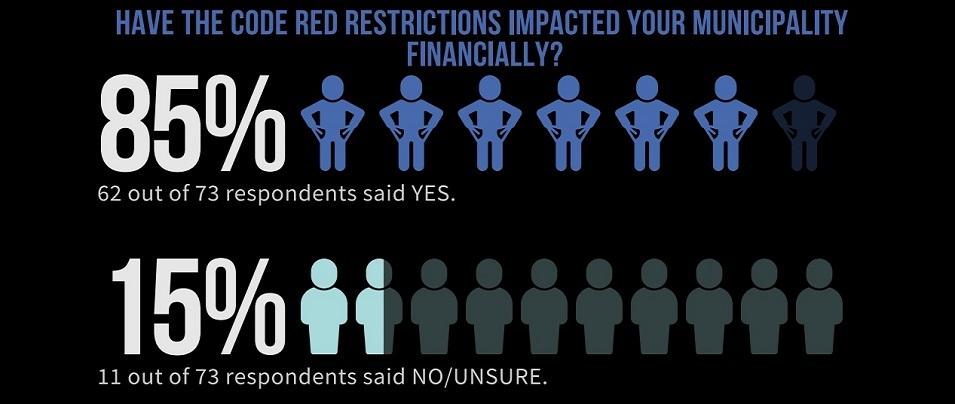Municipalities across Manitoba are warning that they need more support from the provincial government. According to a report released on January 22 by the Association of Manitoba Municipalities (AMM), 85 percent of municipalities say they are struggling under the impacts that code red restrictions have had on their community programs and finances.
The report was prepared by the AMM to support their request for additional pandemic-related financial assistance from the Manitoba government.
When the federal government rolled out its Safe Restart Agreement for municipalities in the fall, Manitoba opted against matching funds to further support municipalities, in contrast to many other provinces in Canada.
Another finding of the reporting, according to the AMM says, shows that the single biggest financial hit for 71 percent of municipalities was due to the closure of community recreation centres.
Another major area of financial loss for municipalities has come in the form of enhanced information technology expenditures, such as updating programs and equipment to allow staff to work from home.
“During these challenging times, municipalities have remained on the front lines delivering essential services Manitobans rely on,” says AMM President Kam Blight. “While the Safe Restart Agreement was designed to support local governments in 2020, the data from the survey strongly suggests that municipalities are facing further revenue losses throughout 2021 and beyond.”
Both the Town of Niverville and the RM Ritchot participated in the AMM’s survey, which ran from December 2020 to January 2021. The timeframe was selected specifically to measure the impacts of the Safe Restart Agreement, code red restrictions, and other financial pressures.
While 66 percent of municipalities found the Safe Restart Agreement has been sufficient to cover losses to date, the results also strongly indicate that municipalities won’t be able to continue covering the current costs in the face of compounding revenue losses.
“The single largest revenue source for municipalities is property tax, but then of course there are grants from other levels of government for programs or capital projects,” says Denys Volkov, executive director for the AMM. “Then there are income streams such as fees, licensing, programs, and community centres. But what we are projecting is that in 2021 and going forward, a lot of the community centres will still not operate the way they did before.”
Notably, Volkov points out that in addition to lost revenue, municipalities will continue to be on the hook for hydro bills, cleaning, sanitization, and other maintenance expenses.
“It is vital that all orders of government continue to work together to ensure municipalities receive all necessary supports, including increased funding to offset operating losses in 2021 and expedited approvals for shovel-worthy infrastructure projects,” adds Kam Blight.
Local Municipalities
Ritchot Mayor Chris Ewen says that his municipality is one where the Safe Restart funds have so far been sufficient to cover losses. Although their main area of financial concern has to do with the operating costs of arenas, they have yet to use all the federal money.
“We are fortunate and grateful to have received Safe Restart funds,” says Ewen. “The facility concern is ongoing and we are continually working to provide funding and strategies.”
Although the RM does have exciting projects on the go, Ewen says that their focus right now is to continue supporting the sites they have.
Niverville has also experienced challenges related to community centres and programs. But according to Mayor Myron Dyck, the town’s most recent financial briefing reveals that the Safe Restart money has been completely allocated.
“While we are grateful for the monies we received, it didn’t cover all our expenses,” says Dyck. “So we’ve had to look at our budget and see what it means for us moving forward. It will mean some belt-tightening for us. For instance, we’re just not able to accurately project what revenue from programs will look like in the fall if we still can’t run as we used to.”
Unique Situation
Dyck highlights the unique situation Niverville finds itself in, being owners of a medical clinic. He says that initially the town had projected that they were on track to meet the goal of making the Open Health medical clinic financial solvent this year, but the onset of the pandemic has led to increased operating costs as well as changes to how appointments are conducted. Notably, virtual appointments don’t yield as much provincial revenue for doctors as in-person appointments.
“We thought we would be in the black by now, and we are making definite steps forward, but COVID has affected [us],” Dyck says.
Aside from the clinic and community centres, Dyck also says the town has seen a decrease in people visiting the community due to travel and gathering restrictions. This impacts the number of people utilizing local services and has resulted in a dip to the employment rate.
All of this being the case, Dyck says that the town isn’t going to just wait around for another provincial handout.
“Any money we get from other levels of government is always appreciated,” he says. “At the same time, we need to not just stand with our hand out and say, ‘Please give.’ We can look at what makes sense to spend within our means.”


